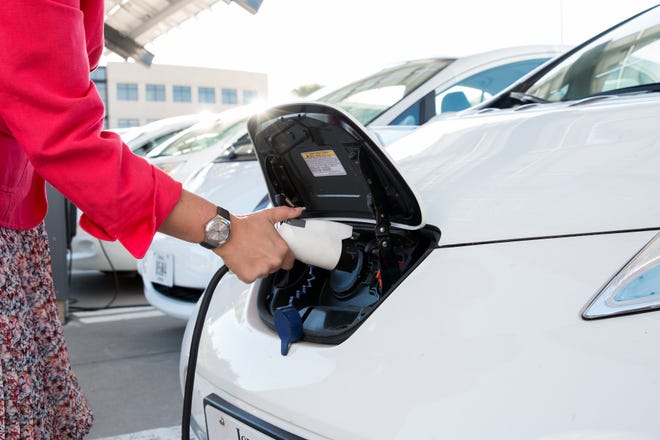Ethanol group opposes new auto emissions requirements

A national trade group that promotes ethanol joined its frequent foe — a trade group that promotes oil companies and refineries — this week in challenging new federal regulations that threaten them both by requiring significantly reduced tailpipe emissions for new vehicles.
The Renewable Fuels Association seeks judicial review of the U.S. Environmental Protection agency rule, which took effect Monday. It sets targets for the manufacturers of light- and medium-duty vehicles that would force them to reduce their carbon dioxide emissions by about half from 2026 to 2032.
The first model year to be affected by the new requirements is 2027.
More:Another roadblock to convincing Americans to buy an EV: plunging resale values
In order to meet those targets, vehicle manufacturers will likely rely on increasing their electric vehicle offerings because the EPA considers them to have no emissions. That will lessen demand for gasoline and ethanol.
“These (greenhouse gas) emission reductions will make an important contribution to efforts to limit climate change and subsequently reduce the probability of severe climate change related impacts including heat waves, drought, sea level rise, extreme climate and weather events, coastal flooding, and wildfires,” the EPA said of the new requirements.
It estimates the requirements will reduce gasoline consumption by about 780 billion gallons over the next 30 years. That’s comparable to what U.S. consumers use in about 5 1/2 years, according to the U.S. Energy Information Administration.
“America’s ethanol producers and farmers would be severely injured if EPA’s regulation were allowed to stand,” said Geoff Cooper, the chief executive of the Renewable Fuels Association.
EPA didn’t consider pollution from manufacturing electric cars, critics complain
Gasoline blends that contain 10% ethanol are by far the most-purchased fuel for passenger vehicles in the country, and several states — including Iowa, the top producer of ethanol — have pushed to make higher ethanol blends more widely available.
Increased demand for ethanol will increase demand for the corn that is used to produce it and should also increase the price farmers are paid for their grain, the RFA reasons.
Critics of the rule say the EPA’s analysis of the environmental benefits of electric cars disregards pollution that results from their production, particularly their batteries. The EPA considered emissions from electricity generation and fuel refining when attempting to determine the overall benefits, but the new rules are based strictly on tailpipe emissions that result from operating the vehicles.
More:‘Green’ ethanol, biodiesel plants release harmful pollutants, environmental group reports
Because the electric vehicles have no tailpipe emissions, they have a tremendous regulatory advantage over those with internal combustion engines.
“EPA grossly exceeded its statutory authority by finalizing regulations that effectively mandate the production of (electric vehicles), while blatantly excluding the ability of flex fuel vehicles and low-carbon, high-octane renewable fuels like ethanol to achieve significant vehicle emissions reductions,” Cooper said.
That is the crux of the judicial reviews several vehicle dealers and groups that advocate for ethanol, farmers and refiners seek in federal court.
The RFA and National Farmers Union filed their lawsuit on Monday. The American Petroleum Institute, American Farm Bureau Federation, National Corn Growers Association and more than a dozen automotive businesses filed suit last week.
“EPA’s final rule exceeds the agency’s statutory authority and is otherwise arbitrary, capricious, an abuse of discretion, and not in accordance with law,” the petition filed last week says.
It’s unclear when the cases will conclude.
Find this story atIowa Capital Dispatch, which is part of States Newsroom, a network of news bureaus supported by grants and a coalition of donors as a 501c(3) public charity. Iowa Capital Dispatch maintains editorial independence. Contact Editor Kathie Obradovich for questions:kobradovich@iowacapitaldispatch.com.



